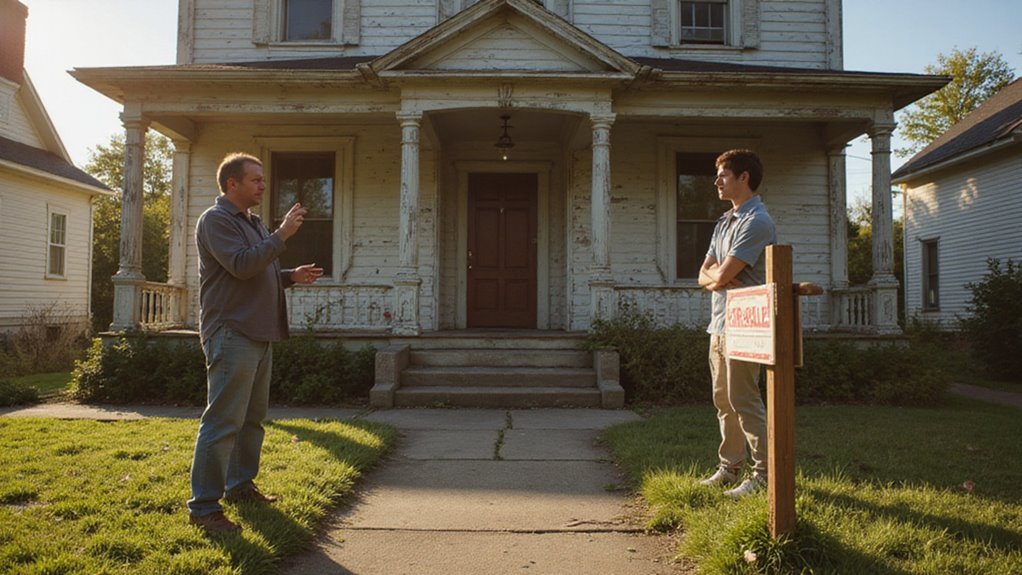Inheriting property with siblings often leads to bitter disputes and family conflicts that last for generations. Disagreements over selling inherited property can tear families apart, especially when some heirs want to sell while others refuse. The situation becomes more stressful when majority owners believe they can force minority owners to sell. Legal battles and emotional strain follow these standoffs. Fortunately, legal pathways like mediation, buyouts, and partition sales offer clear solutions for resolving inherited property disputes.
In Ohio, majority rule cannot force the sale of inherited property. Every co-owner must unanimously agree to sell, regardless of their ownership percentage. Even a 10% owner can legally prevent the sale against a 90% owner’s wishes.
This blog explores selling inherited property, co-owner rights, and legal solutions for property inheritance disputes.
Key Takeaways
- Majority rule cannot force the sale of inherited property; unanimous agreement from all co-owners is legally required.
- A single co-owner can prevent property sale regardless of majority preference, ensuring equal protection of all heirs’ rights.
- Courts prioritize individual property interests over group preferences, requiring consensus for any sale or transfer decisions.
- Without unanimous agreement, a partition lawsuit becomes necessary to force sale through court-ordered liquidation of the property.
- Legal partition typically takes 7-12 months and costs $3,350-$11,000, including filing fees and legal notifications.
Can Majority Rule in Selling an Inherited Property?

No, majority rule cannot force the sale of inherited property in Ohio. Ohio law mandates unanimous agreement from all co-owners to sell inherited real estate. A single co-owner has the right to prevent a property sale, regardless of what others want. This protection ensures fair treatment of all heirs.
To resolve disagreements, owners must pursue negotiation or legal options. The court can order a partition action to divide or sell the property when co-owners cannot reach an agreement. As a result, families should focus on open communication and compromise.
What is Majority Rule in Property Inheritance?
Majority Rule refers to property decisions made by a larger percentage of inheritors over minority owners’ wishes. Most state laws do not recognize majority rule in inheritance matters. Each heir maintains equal legal rights regardless of their ownership share. The courts protect individual property interests above group preferences.
Property decisions require unanimous agreement from all inheritors. When heirs cannot reach consensus, legal partition through courts becomes necessary. This process safeguards everyone’s rights while providing a clear path to resolution.
How Does Joint Inheritance Affect Property Decisions?

Joint inheritance limits individual control over shared property and requires group decisions for major changes. All co-owners must agree before selling, renovating, or taking out loans against inherited property. Each heir holds an equal but undivided stake in the asset. The law treats joint inheritors as tenants in common with distinct ownership rights.
Moreover, disagreements between co-heirs often need mediation or legal help to resolve. Property partition through courts remains a last resort when co-owners cannot reach an agreement. This legal process allows heirs to divide or sell the property fairly.
What Legal Rights Do Co-Owners Have?
When you inherit property with others, you hold specific legal rights that protect your interests and govern how decisions get made. Your rights depend on whether you’re classified as tenants in common or joint tenants, which determines your ownership share and decision-making power. Understanding these distinctions—and your right to seek partition—helps you navigate disagreements and take action when consensus proves impossible.
Rights of Tenants in Common
Rights of Tenants in Common protect your property ownership interests and decision-making authority. Each co-owner has an equal right to use and access the entire property. No single owner can sell or transfer the property without consent from all co-owners. Your distinct share remains protected from other owners’ actions.
Moreover, Ohio law allows tenants in common to request a property partition through courts under Chapter 5307. Legal options include voluntary buyouts or court-ordered division of property. These measures safeguard your investment and prevent unwanted forced sales.
Rights of Joint Tenants
Joint tenants share specific legal rights and obligations in property ownership. Each joint tenant holds equal ownership and maintains an automatic right of survivorship upon another owner’s death. This means surviving owners inherit the deceased’s share regardless of any will provisions. Property transactions require unanimous consent from all joint tenants. No single owner can sell or transfer their interest without agreement.
A joint tenancy breaks when one owner takes independent action like selling or mortgaging their share. In such cases, the property converts to tenancy in common. This change allows owners to pass their share through a will.
Partition Rights in Inherited Property
Partition rights allow co-owners to divide or sell inherited property without unanimous agreement. These legal options protect individual ownership interests when heirs disagree.
A court can order property division through four main methods: sale with profit sharing, physical separation into parcels, buyout arrangements, or mediated agreements. Property owners maintain control through these choices.
Any co-owner can request partition regardless of their ownership percentage. This protection prevents forced ownership and ensures fair value recovery. As a result, heirs maintain flexibility in managing their inherited assets.
How to Navigate Disagreements Among Heirs?
When you and other heirs can’t agree on selling inherited property, you have practical options to resolve the conflict before resorting to court. You can pursue mediation to promote compromise, arrange a formal buyout where one heir purchases the others’ shares, or create a binding property agreement that outlines management and sale terms. These approaches often preserve family relationships while ensuring everyone’s legal rights are protected.
Mediation Among Co-Owners
Mediation helps co-owners resolve property disputes without going to court. A neutral third party guides structured negotiations between disagreeing heirs. Ohio law requires all co-owners to agree before selling inherited property.
Professional mediators create a safe environment for open discussions about concerns and goals. Clear communication leads to creative solutions like buyout options or staged sales plans. This approach preserves important family relationships.
Mediation costs significantly less than legal battles through the court system. Co-owners maintain control over decisions about their shared property. The confidential process protects privacy while building lasting agreements.
Formal Buy-Out Arrangements
A formal buyout lets one heir purchase others’ inheritance shares through legal agreements. Legal contracts must specify the exact purchase price, payment terms, and property transfer timeline. Each heir needs independent legal counsel to protect their interests. Professional appraisals ensure fair market value for all parties.
Moreover, experienced real estate attorneys help structure favorable terms and tax implications. Written documentation prevents future disputes and creates clear obligations between heirs. The process offers a clean solution for families to preserve property ownership while compensating other heirs fairly.
Creating a Property Agreement
A property agreement protects assets and relationships when multiple owners share inherited real estate. Four key elements must appear in your agreement: maintenance cost sharing, decision-making protocols, buyout options, and conflict resolution steps. Clear rules prevent misunderstandings about property expenses and responsibilities.
Your attorney can customize terms based on state laws and family dynamics. The agreement should outline specific procedures before disputes escalate to court. This legal document sets expectations and creates accountability among all parties.
Ohio law permits property partition through sale or division when co-owners cannot reach consensus. A written agreement helps avoid this outcome.
Can a Court Force the Sale of Inherited Property?

If you and your co-heirs can’t agree on selling inherited property in Ohio, any owner can file a partition action under Ohio Revised Code Chapter 5307 to force a court-ordered sale. The court will evaluate whether physical division is practical, and if not, it’ll order the property sold with proceeds split according to ownership shares. You’ll need to prove co-ownership and demonstrate that voluntary agreement isn’t possible, then navigate the legal process including filing fees, notice requirements, and potential court costs that vary based on property intricacy.
Partition by Sale Process
A partition by sale divides property value through court-ordered liquidation when co-owners cannot agree. The process starts with a formal lawsuit filed in civil court against all property co-owners. A judge evaluates ownership percentages and attempts at previous resolutions. The court orders a property sale when physical division proves impractical or reduces value.
Sale proceeds get distributed to owners based on their documented ownership shares. This legal solution prevents property from remaining in limbo due to owner disputes. Most courts favor partition by sale over physical division for residential properties.
Legal Requirements for Forced Sales
Legal requirements for forced property sales protect all owners’ rights through a structured court process. A valid forced sale needs proof of co-ownership through property deeds or probate documents. Co-owners must demonstrate failed attempts at reaching an agreement through written records.
The court requires proper notice to all parties and payment of filing fees before proceeding. Personal attendance at hearings becomes mandatory to determine fair sale terms. Legal fees typically range from $2,000 to $5,000, depending on case complexity.
Furthermore, courts prioritize equitable distribution of proceeds among all property owners. The process usually takes 3-6 months to complete.
Timeline and Costs of Court Intervention
A typical court intervention for inherited property takes 7-12 months and costs $3,350-$11,000 total. The process begins with court filing fees of $200-$400, plus attorney retainer payments. Legal notifications to co-owners add another $150-$300 in the first two months. Attorney fees make up the largest expense, ranging from $3,000-$10,000 based on case complexity.
Meanwhile, the timeline unfolds in clear phases. The initial filing takes 1-2 weeks. Next, legal notices require 6-8 weeks. Subsequently, hearings extend 3-6 months. Finally, the sale phase spans 3-6 months with standard real estate costs. Early mediation can reduce both time and costs significantly.
What Are the Options When Co-Heirs Disagree?
When you and your co-heirs can’t agree on what to do with inherited property, you have four main paths forward. You can sell to a cash buyer for a quick resolution, arrange a buyout where one heir purchases the others’ shares, rent the property to generate income, or maintain shared ownership with clear terms. Each option has distinct legal and financial implications that’ll affect your timeline and net proceeds.
Selling to a Cash Buyer
Cash buyers provide the fastest way to sell inherited property when co-heirs disagree. A cash sale eliminates complex negotiations and financing delays between multiple owners.
Cash buyers submit offers within 48 hours and can close sales in 7-14 days. No repairs, renovations, or staging requirements apply to these transactions. The proceeds become available immediately after closing.
Each heir receives their share based on ownership percentage. This quick resolution prevents ongoing property expenses during disputes. Individual co-owners maintain the right to pursue partition actions while working with cash buyers.
Buying Out Other Heirs
A co-heir must purchase shares from other heirs to gain full property control. A certified appraiser determines the property’s fair market value. Each heir’s buyout price equals their ownership percentage times the total value.
Legal documentation proves essential for this process to work smoothly. A formal purchase agreement protects all parties involved. The buying heir needs proper financing before starting negotiations.
Moreover, all heirs must agree to the sale terms in writing. This solution works best when one heir wants to keep the property. The remaining heirs can receive immediate cash payment instead.
Renting the Property
A rental property provides steady income while preserving the inherited house for future decisions. The rental process requires four key steps: create a legal rental agreement, find a qualified property manager, maintain a repair fund of 1-2% of property value, and conduct yearly market evaluations.
Professional property management handles tenant screening, maintenance calls, and rent collection. This arrangement protects your investment and reduces personal stress.
A rental strategy offers flexibility to sell later when market conditions improve or family members reach agreement.
Maintaining Shared Ownership
Shared ownership requires clear agreements and active cooperation between all property co-owners. A formal written contract must specify each owner’s rights, responsibilities, and financial obligations. The agreement should detail maintenance costs, property taxes, and usage schedules for all parties.
Ohio law permits co-owners to request property partition through Chapter 5307 if cooperation fails. Smart co-owners create an LLC to manage the property professionally. This structure helps prevent disputes and simplifies decision-making processes.
Moreover, thorough documentation protects everyone’s interests and prevents future conflicts. Regular communication between co-owners ensures smooth property management.
Conclusion
When co-owners disagree about selling inherited property, several practical solutions can resolve the situation. Legal options like partition actions allow owners to force a property sale through court intervention. The process may take time, but it provides a clear path forward when negotiations fail.
At Prestige Investments Cincinnati, we understand the challenges of managing inherited properties in Ohio. We offer fair cash offers for houses in Cincinnati and surrounding cities. Our team helps property owners navigate complex situations, including those involving multiple heirs or disputed ownership.
If you’re facing difficulties with co-owners, we can provide a straightforward solution to end the stalemate. We handle all necessary paperwork and coordinate with multiple parties to ensure a smooth transaction. Our experience in dealing with inherited properties across Ohio makes us a reliable partner for resolving property disputes.





